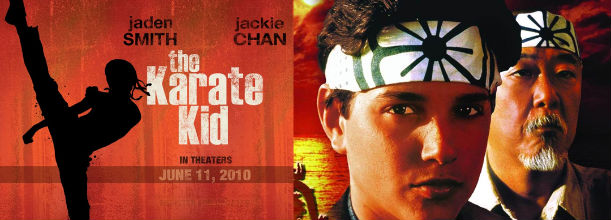Have Remakes Lost the Plot?

I still break out in a cold sweat when I think the travesty that was the remake of the Wicker Man. The original had a special place in my heart and watching Nicolas Cage and co. make such a hash of it was like watching someone drown a kitten. So why do we do this to ourselves as fans? Simply, we can’t help ourselves – we will always be curious to see our objects of fandom, no matter what guise they are in. The original filmmakers however, can choose whether or not to prostitute their creations to the highest bidder. With over 77 Hollywood remakes set to have been released in this year alone, I sense there will be a lot more metaphorical drowned kittens. And this fan is angry.
You mean they don’t speak American?!
The very concept of the remake treats the audience like an idiot. The main offender here being remakes of foreign films. Who wants to read at the cinema or listen to obviously dubbed dialogue? Erm, well me for one, as so much gets lost in translation. The slew of Japanese horror remakes that have sprung up like weeds over the past decade is a testament of this; the American versions have none of Japanese originals’ eerie sensibility and are thus boring rather than terrifying. While the original Japanese versions of Shutter and One Missed Call slowly and stylistically build suspense, the American remakes feel the need to constantly break the tension with cheap shocks that have the audience jumping at nothing and prevent any real build up of terror. Perhaps the most patronizing Hollywood remake of a technically foreign film is last month’s Death at a Funeral, a remake of a British film that was only released itself three years ago. The remake uses the same script and even has one of the same actors play the same part. So, the same then, just without any of those distracting British accents.
In the wrong place at the wrong time
As well as subtitles and unfamiliar accents, Hollywood also believes its audience can’t handle films from a different time period. The lazy and utterly pointless remake of the Italian Job is a typical case. The modern setting is not used to build on the story or add any interesting elements. It instead serves as a bland backdrop against which a group of bland actors soullessly go through the motions of the original like a bunch of 6 year olds performing a nativity. More often than not, remade films lose the entire point of the original, such as the 2006 remake of Alfie. The original explored some of the supposed sexual freedoms of the 60’s and relationships between men and women at a time when gender had been dramatically reevaluated. The remake just has Jude Law trying to hang on to his hair while he tells us how charming he supposedly is.
Redeeming the Remake?
However, even I can admit that a remake does on occasion have something to offer – or in the least fail to be offensive. America does better at remaking genre films; a remake of The Crazies earlier this year was almost timely with superbugs, killer flu and germ warfare becoming an increasingly real threat. The Texas Chainsaw Massacre remake also clearly showed deference to the original whilst still just about standing up in its own right. However while they are not kitten-drowningly offensive, one does have to ask what the point of them is? Is Hollywood really that out of ideas?
Making it work
For a remake to work, it should be based on film whose central idea wasn’t explore to its full potential. David Cronenberg’s The Fly was a remake of a 1958 film, just as John Carpenter’s The Thing was a remake of another fifties flick The Thing From Another World. Both remakes build on the horror and the character development of the original films. The remake of The Fly focuses on the terrifying psychological and physical effects of a slow transformation, where the original has the protagonist almost instantaneously transformed into an out and out monster. The Thing also managed to up the terror of the original by ditching the ropey romantic subplot and giving the creature the ability to transform into members of the group. The Magnificent Seven adapts rather than remakes Kurosawa’s Seven Samurai into a Western, exploring the original story from a different angle. It is here that remakes are successful, when the term, ‘re-envisioning,’ isn’t a fancy way of saying copying, but instead truly means the fusing of an original vision with another equally original vision.
Money talks
Eugene Delacroix, (some French painter from them days to you and me), once stated that, ‘What moves those of genius, what inspires their work is not new ideas, but their obsession with the idea that what has already been said is still not enough.” Sadly for us, Hollywood producers are rarely accused of genius. Their obsession with old ideas has very little to do with trying to get the most out of them creatively and everything to do with getting the most out of them financially. For every The Thing, there will always be tens more Death at a Funeral’s because they are an easy way to make money through minimum effort. The box-office doesn’t lie – whatever critical response they may receive, remakes get bums on seats. They are the fast food of cinema – cheap, convenient, un-taxing, but ultimately unsatisfying. They are also more often than not the only choice. Foreign films rarely get a general release and classic films are not often re-released for the big screen either. The audience is required to seek them out. So seek, dear reader, for in this age of recycled ideas it is more important than ever to strike a blow for originality.





Recent Comments